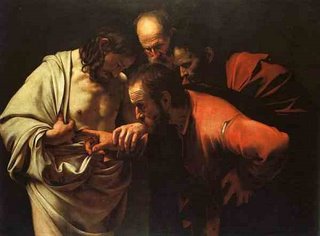LEARN FROM HIS DOUBTING

Feast of St. Thomas, Apostle
Jn 20:24-29
We celebrate today the feast of St. Thomas, Apostle. It is unfortunate that the word “doubt” is almost synonymous with the name of this apostle. Thus, we have “Doubting Thomas”.
Yes, Thomas doubted that the Lord truly rose from the dead. Yes, he needed proof before believing in the resurrection. Yes, he refused to believe until he touched the nail marks on the hands of Jesus and put his hand inside His pierced side. But there are three things we can learn from this apostle whom the world judges to be too doubtful.
First, Thomas was sincere. He was honest about his disbelief. He doubted but his doubt was truthful. His was not a doubtful not simply to be different from the rest of the apostles. He simply could not believe. He was honest.
Second, Thomas was not a crowd pleaser. While he could not bring himself to believe in the Lord’s resurrection without having proofs, he did not say he believes just because the others believed. Thus, while he did not want to be different from the rest, he was not afraid to be different from the others if it meant accepting something he could not really accept. He was principled.
Third, Thomas knew how to accept mistakes. When given the proofs he required, Thomas believed indeed and uttered his famous proclamation, “My Lord and my God.” He doubted, but he believed. His faith in the resurrected Lord was sealed by his labors in preaching the Gospel to as far as he could go and, eventually, by his martyrdom.
No problem with doubting, you see. The problem is when we doubt simply because we want to be different, when we do not doubt because we short-change our principles, and when we refuse to accept our mistakes when we are finally shown the proofs we require.
Doubting Thomas? No problem with that, provided that we do not forget that he believed and learn the lesson his doubt teaches us.
Jn 20:24-29
We celebrate today the feast of St. Thomas, Apostle. It is unfortunate that the word “doubt” is almost synonymous with the name of this apostle. Thus, we have “Doubting Thomas”.
Yes, Thomas doubted that the Lord truly rose from the dead. Yes, he needed proof before believing in the resurrection. Yes, he refused to believe until he touched the nail marks on the hands of Jesus and put his hand inside His pierced side. But there are three things we can learn from this apostle whom the world judges to be too doubtful.
First, Thomas was sincere. He was honest about his disbelief. He doubted but his doubt was truthful. His was not a doubtful not simply to be different from the rest of the apostles. He simply could not believe. He was honest.
Second, Thomas was not a crowd pleaser. While he could not bring himself to believe in the Lord’s resurrection without having proofs, he did not say he believes just because the others believed. Thus, while he did not want to be different from the rest, he was not afraid to be different from the others if it meant accepting something he could not really accept. He was principled.
Third, Thomas knew how to accept mistakes. When given the proofs he required, Thomas believed indeed and uttered his famous proclamation, “My Lord and my God.” He doubted, but he believed. His faith in the resurrected Lord was sealed by his labors in preaching the Gospel to as far as he could go and, eventually, by his martyrdom.
No problem with doubting, you see. The problem is when we doubt simply because we want to be different, when we do not doubt because we short-change our principles, and when we refuse to accept our mistakes when we are finally shown the proofs we require.
Doubting Thomas? No problem with that, provided that we do not forget that he believed and learn the lesson his doubt teaches us.


2 Comments:
I am tempted to say, 'O happy doubt of Thomas that won for us a holy conviction'.
You can also read:
Feast of St. Thomas - Apostle to India
Help us Jesus that we will be able to accept our faults and be humble to learn on our mistakes.
God bless po.
Post a Comment
Subscribe to Post Comments [Atom]
<< Home